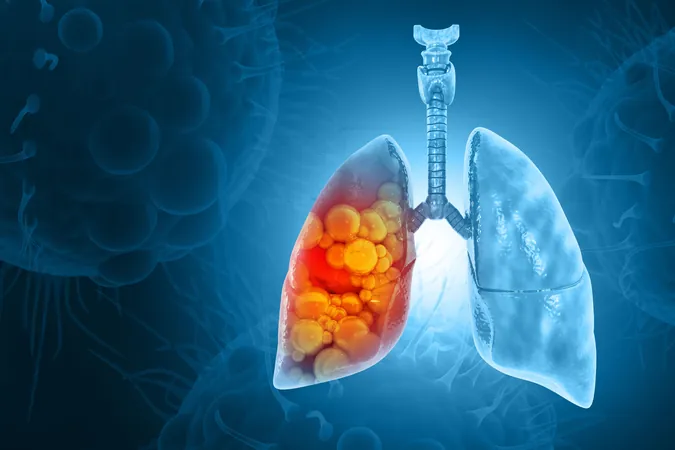
Revolutionary AI Tool Promises to Transform Coeliac Disease Diagnosis!
2025-03-31
Author: Nur
A groundbreaking study funded by the National Institute of Health and Care Research (NIHR) has revealed that a cutting-edge artificial intelligence (AI) tool can significantly expedite the diagnosis of coeliac disease, a condition that affects millions worldwide.
Coeliac disease arises when the immune system mistakenly attacks the body’s own tissues in response to gluten, a protein found in wheat, barley, and rye. This response wreaks havoc in the intestines, inhibiting nutrient absorption and leading to distressing symptoms like abdominal pain, bloating, and even serious health complications if left untreated. The traditional diagnostic approach typically involves blood tests and, for confirmation, a biopsy of the small intestine.
However, research published in the esteemed New England Journal of Medicine demonstrates a revolutionary approach. The AI tool can analyze biopsy samples with remarkable efficiency, slashing waiting times and empowering specialist pathologists to diagnose and treat more patients in less time. This vital study, steered by the Cambridge University Hospitals NHS Foundation Trust, represents a significant advancement in the intersection of technology and healthcare.
First-Ever Use of AI in Coeliac Disease Diagnosis
While AI has already transformed areas like cancer diagnosis, this marks its debut in the realm of coeliac disease. Professor Liz Soilleux, who led the study and serves as an Honorary Consultant Pathologist, shared, “Receiving a precise diagnosis can take years. Considering the increasing demands on healthcare services, these delays will likely persist without change. AI’s introduction is a game changer, potentially reducing diagnosis times dramatically and easing the burden on NHS waiting lists.”
Utilizing sophisticated machine learning techniques, researchers trained the AI on a vast collection of 4,000 biopsy images from five NHS hospitals, teaching it to differentiate between healthy samples and those indicative of coeliac disease. When tested on an additional 650 biopsies, the AI achieved an impressive diagnostic accuracy rate exceeding 97%, aligning with the standards set by seasoned pathologists.
Dr. Florian Jaeckle, from the Department of Pathology and a key author of the study, remarked, “For the first time, we verify that AI can diagnose coeliac disease with the same precision as an experienced pathologist. Our model’s training employed a diverse dataset, assuring its adaptability across various healthcare environments where biopsy processing may differ.”
The Road Ahead: Validation and Implementation
Looking ahead, the team is poised to validate the AI algorithm on a much grander clinical scale, aiming to move through regulatory processes and bring it closer to everyday use within the NHS.
In an exciting development, the University of Cambridge has established Lyzeum Ltd, a new spinout company dedicated to commercializing this AI technology, highlighting the increasing trend of bridging medical research and practical application.
Bridging the Gap: AI Interpretation and Patient Trust
In addition to enhancing diagnostic speed, the researchers are keen on collaborating with patient advocacy groups like Coeliac UK to ensure that AI-generated diagnoses are comprehensible to patients. While AI excels at pattern recognition, translating these patterns into clear medical insights remains a challenge. The team stresses the importance of transparency in AI diagnostics to foster confidence among patients and healthcare providers alike.
As AI continues to reshape healthcare, this pioneering tool offers hope not only for quicker diagnoses but also for a future where patient trust in technology enhances their treatment experience. The promise of a swift, accurate diagnosis for coeliac disease is on the horizon, marking a significant leap forward in patient care.



 Brasil (PT)
Brasil (PT)
 Canada (EN)
Canada (EN)
 Chile (ES)
Chile (ES)
 Česko (CS)
Česko (CS)
 대한민국 (KO)
대한민국 (KO)
 España (ES)
España (ES)
 France (FR)
France (FR)
 Hong Kong (EN)
Hong Kong (EN)
 Italia (IT)
Italia (IT)
 日本 (JA)
日本 (JA)
 Magyarország (HU)
Magyarország (HU)
 Norge (NO)
Norge (NO)
 Polska (PL)
Polska (PL)
 Schweiz (DE)
Schweiz (DE)
 Singapore (EN)
Singapore (EN)
 Sverige (SV)
Sverige (SV)
 Suomi (FI)
Suomi (FI)
 Türkiye (TR)
Türkiye (TR)
 الإمارات العربية المتحدة (AR)
الإمارات العربية المتحدة (AR)